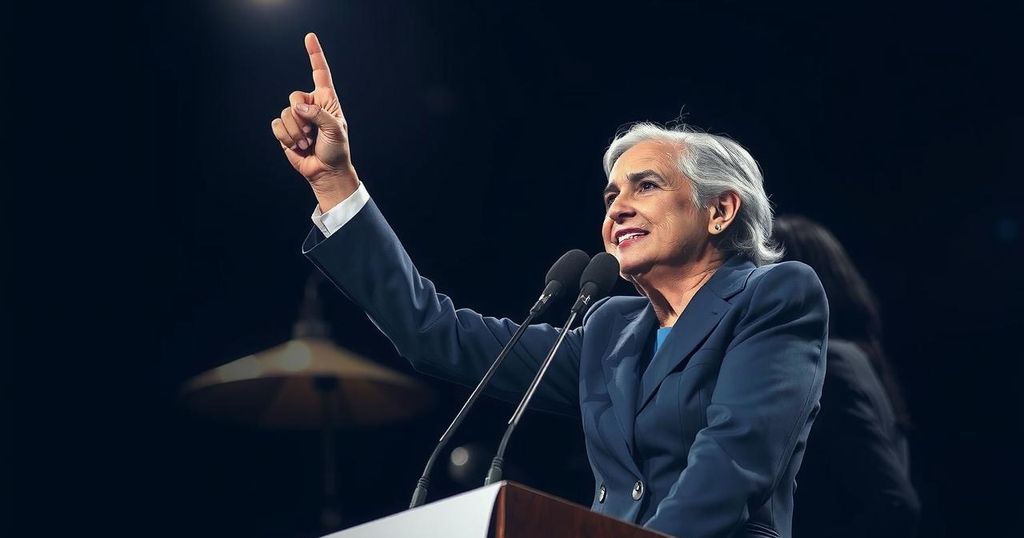Yamandú Orsi has been elected as Uruguay’s next president, succeeding five years of conservative rule. Orsi, from the left-wing Frente Amplio coalition, won with 49.8% of the vote against Alvaro Delgado. His campaign focused on unity and dialogue, and he plans to address issues like drug-related crime and economic recovery. The election marks a return to left governance, celebrated by some regional leaders and supporters after significant previous social reforms. Orsi’s administration will face challenges, including a split legislative body as they attempt to advance reforms.
In a significant political shift, Uruguay has elected left-wing candidate Yamandú Orsi as its new president, marking the end of five years of conservative governance. Orsi, representing the Frente Amplio (Broad Front) coalition, triumphed in a narrow runoff election held on November 24, 2024, garnering 49.8% of the vote compared to 45.9% for Alvaro Delgado of the National Party. Orsi’s campaign emphasized unity and dialogue, with a commitment to fostering national consensus.
In his victory speech delivered in Montevideo, Orsi assured his supporters of his intention to prioritize dialogue to formulate effective governance strategies. He received commendations from outgoing President Luis Lacalle Pou, and this transition marks a return to leftist leadership for Uruguay, which previously experienced a 15-year tenure under Frente Amplio until 2020. That period was notable for significant advances in social policies, including the legalization of abortion, same-sex marriage, and recreational cannabis.
Celebrations erupted in Montevideo, a stronghold for Orsi’s supporters, highlighting the enthusiasm surrounding his election. Orsi’s campaign was notably supported by José “Pepe” Mujica, a revered former president known for his progressive principles and modest lifestyle. Though Orsi has committed to continuity rather than drastic changes, he faces considerable challenges, such as addressing rising crime rates linked to drug trafficking and stimulating economic recovery following a historic drought and the adverse effects of the COVID-19 pandemic.
The political landscape reveals complexities for Orsi, as Frente Amplio achieved a Senate majority but remains a minority in the Chamber of Representatives, indicating potential hurdles in implementing major reforms. Orsi’s victory resonated beyond Uruguay, with various Latin American leaders congratulating him, including Brazilian President Luiz Inácio Lula da Silva, who hailed it as “a triumph for all of Latin America and the Caribbean.”
Uruguay is recognized for its robust democracy, high living standards, and low poverty rates. The previous administration under Frente Amplio was influential in international social reform movements, solidifying the country’s position as a leader in progressive policies, particularly around drug law reforms. Orsi’s election reflects the electorate’s desire to revisit these values while actively confronting current socio-economic challenges. Reflecting on the future, Mujica stated, “My closest future is the cemetery, but I care deeply about the world you, the young, will inherit.” Meanwhile, Orsi’s inauguration is anticipated to occur without significant disruption, scheduled for March 1, 2025.
Yamandú Orsi’s election as president of Uruguay marks a pivotal moment in the country’s political landscape, transitioning from five years of conservative leadership back to leftist governance. This election follows a history of significant social reforms under the Frente Amplio coalition, which previously governed for 15 years until 2020. Social reforms, including legalizing abortion and cannabis, became hallmarks of that era, and Orsi’s campaign has signaled a commitment to continuing such progressive policies while addressing contemporary issues such as crime and economic recovery. Uruguay has established itself as a stable democracy in Latin America, distinguished by its high standards of living and active civic participation. However, challenges such as crime and economic instability due to fluctuating global conditions remain pressing concerns for the new administration. Orsi’s leadership is thus viewed as a crucial factor in navigating these challenges while seeking to restore the values and achievements of previous progressive administrations.
The election of Yamandú Orsi to the presidency signifies a critical juncture for Uruguay, as the country returns to left-wing leadership after several years of conservative governance. Orsi’s commitment to dialogue and consensus-building will be essential in addressing challenges such as rising crime and economic recovery. His administration will seek to build upon Uruguay’s history of progressive reforms while grappling with contemporary issues. The upcoming transition of power, expected to be smooth, foreshadows a significant impact on Uruguay’s political and social landscape leading into 2025.
Original Source: dailypost.ng






